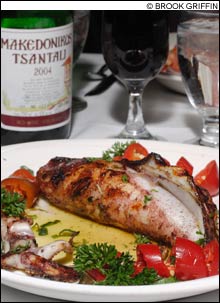 A Phoenix staffer of Greek descent once told me, “I don’t judge Greek restaurants by their lamb anymore: I now judge them by their octopus.” Well, I’ve got your restaurant, buddy. Dionysos, hidden on the second floor of a second-tier Cambridge hotel, is actually an important meeting place for Greek Americans and a much more serious Greek restaurant than anyone would expect. For years, I’ve been urging Greek restaurateurs to come out from behind their Italian and seafood menus to promote the true and wonderful food of their ancestral homes. Usually this starts happening in little family-run cafés, but here is a full-blown, 100-seat, fancy place with a drop-dead view of the Charles River. For us, it was a chance to get a fine dinner before a jazz show at Scullers. But for most of the early patrons, it was dessert after a christening, and they were dressed to the nines and having a wonderful celebration.
A Phoenix staffer of Greek descent once told me, “I don’t judge Greek restaurants by their lamb anymore: I now judge them by their octopus.” Well, I’ve got your restaurant, buddy. Dionysos, hidden on the second floor of a second-tier Cambridge hotel, is actually an important meeting place for Greek Americans and a much more serious Greek restaurant than anyone would expect. For years, I’ve been urging Greek restaurateurs to come out from behind their Italian and seafood menus to promote the true and wonderful food of their ancestral homes. Usually this starts happening in little family-run cafés, but here is a full-blown, 100-seat, fancy place with a drop-dead view of the Charles River. For us, it was a chance to get a fine dinner before a jazz show at Scullers. But for most of the early patrons, it was dessert after a christening, and they were dressed to the nines and having a wonderful celebration.
Because it is in a hotel, the restaurant has a tendency to hold back a bit on the garlic and tone things down. Thus both of our lamb entrées were excellent but didn’t overemphasize the lamb-rosemary-garlic flavor. On the other hand, with a dish like octapodi skaras ($11), or broiled octopus, you may prefer things a mite upscaled and refined. And in fact, this was supremely tender grilled octopus (I have no idea how this can be done), with a tamed-down seafood flavor that was ideal in a simple dressing of balsamic vinegar and oil. A straight-lamb fan may not rate Dionysos so highly, but I’ve never enjoyed octopus like this. It was better than lobster — and I’ve lived all my life in New England.

Toning down the traditional appetizers has pluses and minuses. I rate Greek restaurants by their skordalia ($6), a garlic spread with enough bread or potato filler to bring out its full bite. But at Dionysos (on the menu described as the god of vegetation, civilization, and pleasure, as well as his better-known cabinet portfolio as god of wine), the skordalia is mashed potatoes with a little garlic — not even as much as you get in a good French bistro. On our small “sampler pikilia” ($13; $18/large), the taramosalata ($6 on its own) was so refined that I mistook it for especially light and tasty hummus. This dip, based on salty codfish roe, should be a little stronger, although hummus lovers might be momentarily converted. The eggplant dip ($8 on its own) was very, very good, however, with moments of real garlic, real smoke, and pure eggplant flavor. Tzatsiki ($6), the Greek answer to a yogurt-cucumber raita, was good — not great. Strengthening all these dips was an excellent basket of grilled pita slices and a crusty white bread.
My second-favorite appetizer was an order of saganaki ($8), which wasn’t as entertaining as the flaming version we had a couple of years ago at Ithaki, in Ipswich, but it had more flavor because a better line of aged cheese went into the deep-fryer. A Greek salad ($7/small; $10/large) was similarly elevated by above-average feta and kalamata olives, although the dish received demerits for chunks of a pink winter tomato. Charge us another dollar and go for the grape tomatoes with actual flavor.
My favorite entrée was good old moussaka ($18; $17/vegetarian), here a casserole of about double the usual portion, and again featuring winter eggplant with real eggplant flavor. It contained the usual layers of ground-meat and béchamel sauce, and an unusual aspect: home-style layers of potato and zucchini.
We took home about half of a chicken youvetsi ($19; $21/lamb): a casserole of beautiful orzo pasta and boneless chicken breast in a cinnamon-inflected tomato sauce. This came to the table in the clay pot it had been baked in, as does the lamb kleftiko ($20). The kleftiko was a lamb shank overcooked to the so-tender-it-melts-in-your-mouth level of tenderness, but I’d rather it were cooked a little less and imbued with more lamb flavor.
Lamb chops ($24) were three baby chops, medium-rare as ordered, but again without the full lamb flavor, perhaps because my idea of this is based on some caramelized lamb fat, and quite a bit of garlic and rosemary. All dinners come with a vegetable and two starches: roast potatoes and a heap of baked rice. (Since the youvetsi is a large casserole of rice-shaped pasta, you get only the potatoes.) The vegetable on all platters was overcooked green beans (and I agree with fellow critic Corby Kummer that overcooking green beans is necessary for full flavor) in a tomato-onion sauce.